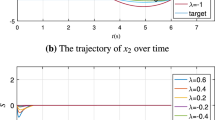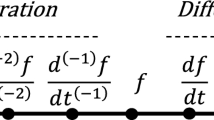Abstract
This paper deals with the stabilizing of hybrid adaptive cruise control (ACC) systems in the presence of external disturbances and model uncertainties. Considering that upper bound of model uncertainties and external disturbances is a nonlinear function of ACC system states with unknown coefficients, a new robust-adaptive fractional-order sliding mode controller (RAFOSMC) is developed. The unknown coefficients of the functional upper bound of perturbations are obtained via some stable adaptive rules. Stability proof of the proposed RAFOSMC is presented based on Lyapunov theorem. It is also analytically shown that the proposed FOSMC has better performance than ordinary integer-order sliding mode controllers (IOSMC). Using FOSMC benefits a significant reduction in chattering and also faster convergence to the vehicle's safe distance in the vehicle's initial movement. Finite-time convergence of system states to the fractional sliding surface is then obtained, and a new approximation of sign function for more chattering elimination is also proposed in this paper. Simulation results and presented comparisons at the end of this paper show the effectiveness of the proposed methodologies.












Similar content being viewed by others
Data availability
Data sharing not applicable to this article as no datasets were generated or analyzed during the current study.
References
Madhusudhanan AK (2019) A method to improve an electric vehicle’s range: efficient cruise control. Eur J Control 48:83–96
Ganesan M, Ezhilarasi D, Benn J (2017) Second-order sliding mode controller with model reference adaptation for automatic train operation. Int J Veh Mech Mobil. https://doi.org/10.1080/00423114.2017.1330482
Mizoshiri T, Mori Y (2017) Application of adaptive sliding mode control with an ellipsoidal sliding surface for vehicle distance control. SICE J Control MeasSyst Integr 10(1):25–31
Trotta A, Cirillo A, Giorelli M (2019) A feedback linearization based approach for fully autonomous adaptive cruise control. In: 2019 18th European control conference (ECC) Napoli, Italy, 25–28 June 2019
Lin YC, Hsu HC, Chen WJ (2016) Dynamic programming for model predictive control of adaptive cruise control systems. In: 2015 IEEE international conference on vehicular electronics and safety (ICVES), 2016, pp 202–207
Luo L (2019) Adaptive cruise control design with consideration of humans’ driving psychology. In: Proceeding of the 11th world congress on intelligent control and automation, 2019, 973–2978
Luu DL, Lupu C, Cristian I, Doan VK (2021) Speed control and spacing control for autonomous mobile robot platform equipped with infrared sensors. In: 2021 16th international conference on engineering of modern electric systems (EMES), 2021, pp 1–4
Alonso L, Pérez-Oria J (2014) Genetic optimization of fuzzy adaptive cruise control for urban traffic. In: Matía F, Marichal GN, Jiménez E (eds) Fuzzy modeling and control: theory and applications. Springer, pp 255–271
Wang Z, Gao Y, Fang C, Sun Y, Si P (2019) Optimal control design for connected cruise control with edge computing, caching, and control. In: IEEE INFOCOM 2019: IEEE conference on computer communications workshops (INFOCOM WKSHPS), 2019, pp 1–6
Moser D, Schmied R, Waschl H, del Re L (2018) Flexible spacing adaptive cruise control using stochastic model predictive control. IEEE Trans Control Syst Technol 26:114–127
Wang X, Zhu L, Wang H, Tang T, Li K (2021) Robust distributed cruise control of multiple high-speed trains based on disturbance observer. IEEE Trans Intell Transp Syst 22(1):267–279
Hidayatullah MR, Juang J-C (2021) Adaptive cruise control with gain scheduling technique under varying vehicle mass. IEEE Access 9:144241–144256
Utkin VI, Guldner J, Shi J (2009) Sliding mode control in electro-mechanical systems, 2nd edn. CRC Press, Boca Raton
Sun Zh, Zhong G, Lu Y, Zhang W (2018) Leader-follower formation control of underactuated surface vehicles based on sliding mode control and parameter estimation. ISA Trans 72:15–24
Shahravi M, Azimi M (2016) A hybrid scheme of synthesized sliding mode/strain rate feedback control design for flexible spacecraft attitude maneuver using time scale decomposition. Int J Struct Stab Dyn 16(2):1450101
Azimi M (2020) Stabilization of a large flexible spacecraft using robust adaptive sliding hypersurface and finite element approach. Int J Dyn Control 8(2):644–655
Azimi M, Moradi S (2021) “Robust optimal solution for a smart rigid–flexible system control during multimode operational mission via actuators in combination. Multibody Syst Dyn 52(3):313–337
Ferrara A, Pisu P (2004) Minimum sensor second-order sliding mode longitudinal control of passenger vehicles. IEEE Trans Intell Transp Syst 5(1):20–32
Li Z, Song A (2009) Sliding mode control based on tracking differentiator for intelligent vehicle headway distance control. In: Proceedings of the IEEE international conference on intelligent computing and intelligent systems (ICIS) Shanghai, Nov 2009, pp 489–493
Polyakov A, Fridman L (2014) Stability notions and Lyapunov functions for sliding mode control systems. J Frankl Inst 351(4):1831–1865
Gonzalez T, Moreno JA, Fridman L (2012) Variable gain super-twisting sliding mode control. IEEE Trans Autom Control 57(8):2100–2105
Soorki MN, Tavazoei MS (2018) Adaptive robust control of fractional-order systems in the presence of model uncertainties and external disturbances. IET Control Theory Appl 12(7):961–969
Wang HP, Mostafa Ghazally IY, Tian Y (2018) Model-free fractional-order sliding mode control for an active vehicle suspension system. Adv Eng Softw 115:452–461
Yin C, Chen YQ, Zhong SM (2014) Fractional-order sliding mode based extremum seeking control of a class of nonlinear systems. Automatica 50(12):3173–3181
Yin C, Huang X, Chen Y, Dadras S, Zhong SM, Cheng Y (2017) Fractional-order exponential switching technique to enhance sliding mode control. Appl Math Model 44:705–726
Corona D, Schutter BD (2007) Comparison of a linear and a hybrid adaptive cruise controller for a SMART. In: Proceedings of the 46th IEEE conference on decision and control New Orleans. LA, USA, 12–14 Dec 2007
Podlubny I (2018) Fractional-order-based ACC/CACC algorithm for improving string stability. Preprint submitted to transportation research part C: emerging technologies, 26 July 2018
Naderi Soorki M, Tavazoei MS (2016) Asymptotic swarm stability of fractionalorder swarm systems in the presence of time-delays. Int J Control 90(6):1182–1191
Yin C, Xue J, Cheng Y, Zhang B, Zhou J (2018) Fractional-order non-singular fast terminal sliding mode control technique for the 6-DOF robotic manipulator. In: Proceedings of the 37th Chinese control conference, Wuhan, China, 25–27 July 2018
Soorki MN, Tavazoei MS (2013) Fractional-order linear time-invariant swarm systems: asymptotic swarm stability and time response analysis. Cent Eur J Phys 11(6):845–854
Zhang BT, Pi YG, Luo Y (2012) Fractional-order sliding-mode control based on parameters auto-tuning for velocity control of permanent magnet synchronous motor. ISA Trans 51(5):649–656
Ganji B, Kouzani AZ, Khoo SY, Nasir M (2014) A sliding-mode-control-based adaptive cruise controller. In: 11th IEEE international conference on control & automation (ICCA), Taichung, Taiwan, 18–20sss June 2014
Funding
There is not funding to report for this submission.
Author information
Authors and Affiliations
Contributions
S. Sheykhi: Conceptualization, Methodology, Software, Writing-Original draft, H. Gholizade: Formal analysis, Investigation, Visualization, Supervision, Project administration.
Corresponding author
Ethics declarations
Conflict of interest
The authors whose names are listed immediately aboved certify that they have NO affiliations with or involvement in any organization or entity with any financial interest (such as honoraria; educational grants; participation in speakers’ bureaus; membership, employment, consultancies, stock ownership, or other equity interest; and expert testimony or patent-licensing arrangements), or non-financial interest (such as personal or professional relationships, affiliations, knowledge or beliefs) in the subject matter or materials discussed in this manuscript.
Rights and permissions
About this article
Cite this article
Sheykhi, S., Gholizade-Narm, H. Providing robust-adaptive fractional-order sliding mode control in hybrid adaptive cruise control systems in the presence of model uncertainties and external disturbances. Int. J. Dynam. Control 10, 1955–1967 (2022). https://doi.org/10.1007/s40435-022-00936-2
Received:
Revised:
Accepted:
Published:
Issue Date:
DOI: https://doi.org/10.1007/s40435-022-00936-2




